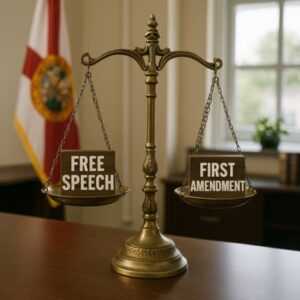What Florida Employers Need to Know About Free Speech in the Workplace
 By: Scott Atwood, Esq.
By: Scott Atwood, Esq.
Headlines across the country have highlighted employees losing their jobs after making offensive comments about recent tragedies. Teachers, television personalities, and other professionals have been disciplined or terminated following statements many found appalling. Others argue these consequences go too far, raising questions about whether such speech is protected. For Florida business owners and HR professionals, the debate underscores a pressing issue:
“When offensive speech becomes public, what are an employer’s legal rights and responsibilities?”
Free Speech and the First Amendment
The First Amendment protects individuals from government restrictions on speech. It does not apply to private employers. Outside of certain exceptions for public employees or activity protected by specific laws, Florida employers have no constitutional obligation to retain employees who make inflammatory or divisive remarks. Put simply, an employee cannot rely on the First Amendment as a shield against discipline in the private workplace.
For more background, see the U.S. Equal Employment Opportunity Commission on federal protections and the National Labor Relations Board on employee rights under federal labor law.
Florida is an At-Will Employment State
Florida law generally recognizes “at-will” employment. This means an employee can be disciplined or discharged for nearly any reason, as long as the reason is not unlawful. Employers cannot, for example, terminate an employee because of their race, gender, religion, disability, age, or in retaliation for asserting certain protected rights.
Beyond those limits, employers have wide latitude to act when an employee’s words threaten workplace culture, client relationships, or the company’s reputation.
When Offensive Speech Becomes a Workplace Issue
Not every controversial comment will justify discipline. Still, some statements are severe enough to affect the workplace in meaningful ways. The most serious situations arise when offensive speech targets people based on protected characteristics. Those comments may create or contribute to a hostile work environment under state or federal law, triggering a legal duty for the employer to investigate and respond.
Even when not discriminatory, offensive speech can erode morale and disrupt collaboration. Team members may no longer trust one another, customer relationships may be damaged, and the company’s public image may suffer. In an era where social media can broadcast a single post to thousands within minutes, reputational harm can be both immediate and significant. Employers have a legitimate interest in addressing conduct that undermines confidence in their workforce or organization.
The difficulty lies in context. A comment made at home may be perceived differently than one voiced in a meeting. Remarks directed at co-workers carry a different weight than those aimed at the general public. Employers must carefully evaluate not only the content of the speech, but also where it occurred, who was affected, and how it relates to established workplace policies.
Practical Steps for Florida Employers
Employers faced with offensive speech should act with both care and consistency. The first step is to ensure policies are in place. A well-drafted employee handbook should set expectations for workplace behavior, outline rules for social media use, and establish procedures for addressing complaints. These policies must be communicated clearly and enforced evenly.
When an incident arises, employers should review the facts promptly and document their findings. That review should focus on whether the speech violated existing policy, created a risk of liability, or damaged the business. In some cases, corrective action such as coaching or a written warning may be sufficient. In others, where trust and workplace integrity are compromised, termination may be the most appropriate option.
Employers should also remain mindful of protected activity. Speech tied to working conditions, wages, or union discussions may fall under the protection of the National Labor Relations Act. Similarly, complaints about discrimination, harassment, or safety can be protected from retaliation. Overlooking these protections can escalate a manageable matter into costly litigation.
Finally, in high-profile or sensitive cases, consulting with legal counsel before taking action is a wise step. Counsel can help weigh risks, apply policies fairly, and minimize exposure to claims. Equally important is ensuring managers and HR staff are trained to recognize issues and escalate them appropriately.
Bottom Line
Private employees have no First Amendment rights in a private workplace. Generally, Florida employers are not required to tolerate employee speech that disrupts operations, damages morale, or harms reputation. At the same time, responses must be thoughtful, consistent, and legally sound. By combining clear policies with careful evaluation and, when needed, legal guidance, employers can protect both their business interests and their workplace culture.
Employers needing assistance may reach me at scott.atwood@henlaw.com to schedule a consultation.

